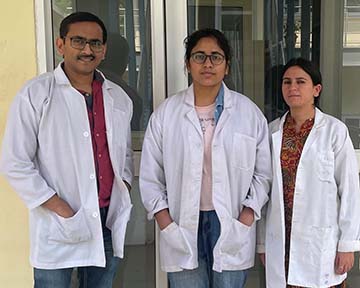MANDI: In major breakthrough, the researchers at the Indian Institute of Technology Mandi have identified a drug molecule that can be used to treat diabetes.
This molecule, called PK2 is able to trigger the release of insulin by the pancreas and can potentially be used as an orally administered medicine for diabetes, researchers found.
The findings of the research have been published in the Journal of Biological Chemistry. The paper has been authored by Dr. Prosenjit Mondal, Associate Professor, School of Basic Sciences, and co-authored by Prof. Subrata Ghosh, School of Basic Sciences, IIT Mandi.
Others include Dr. Sunil Kumar, ICAR- IASRI, PUSA, New Delhi, Dr. Budheswar Dehury, ICMR RMRC, Bhubaneswar, Dr. Khyati Girdhar, Ms. Shilpa Thakur, Dr.Abhinav Choubey, Dr. Pankaj Gaur, Ms. Surbhi Dogra, Ms. Bidisha Biswas from IIT Mandi, and Dr.Durgesh Kumar Dwivedi (Regional Ayurvedic Research Institute (RARI) Gwalior),
Dr. Prosenjit Mondal said, “Current drugs such as exenatide and liraglutide used for diabetes, are administered as injections, and they are costly and unstable after administration. We seek to find simpler drugs that are stable, cheap, and effective against both Type 1 and Type 2 diabetes.”
Diabetes is associated with insufficient insulin release by the beta cells of the pancreas in response to blood glucose levels. The release of insulin entails many intricate biochemical processes.
To find alternatives to these drugs, the multi-institutional team first used computer simulation methods to screen various small molecules that can bind with GLP1R. While PK2, PK3, and PK4 had good binding abilities with GLP1R.
They subsequently chose PK2 because of its better solubility in solvents. The researchers then synthesized PK2 in the lab for further testing.
Dr.Khyati Girdhar, said, “We first tested the binding of PK2 on GLP1R proteins in human cells and found that it is able to bind well toGLP1R proteins. This showed that PK2 can potentially trigger insulin release by the beta cells.”
The researchers found that PK2 was rapidly absorbed by the gastrointestinal tract, which means that it can be used as an oral medication rather than an injection.
Furthermore, after two hours of administration, PK2 was found distributed in the liver, kidney, and pancreas of the mice, but there were no traces of it in the heart, lungs, and spleen.
There was a small amount present in the brain, which shows that the molecule may be able to cross the blood-brain barrier. It was cleared from circulation in about 10 hours.
Dr. Prosenjit Mondal points to another critical finding in their work, “Beyond increasing insulin release, PK2 was also able to prevent and even reverse beta cell loss, a cell essential for insulin production, making it effective for both Type 1 and Type 2 diabetes.”
In order to test the biological effects of PK2, the researchers administered it orally to experimental mice developing diabetes and measured glucose levels and insulin secretion.
There was a six-fold increase in serum insulin levels in PK2-treated mice over the control group. These findings provide hope for inexpensive oral drugs for diabetic patients, they found.




